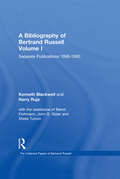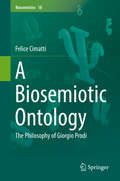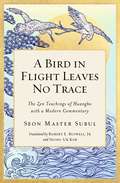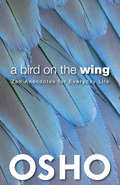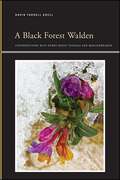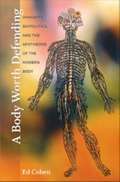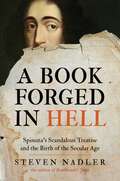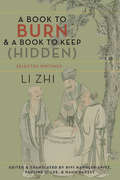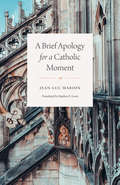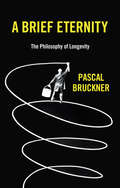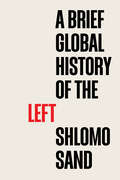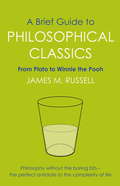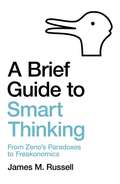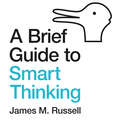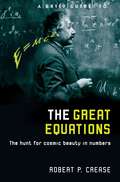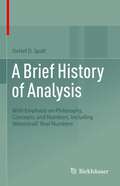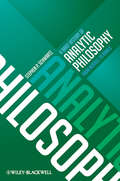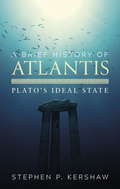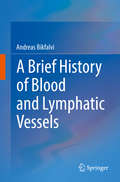- Table View
- List View
A Bibliography of Bertrand Russell: Volume I: Separate Publications, 1896-1990 (The Collected Papers of Bertrand Russell)
by Kenneth Blackwell Harry Ruja Bernd Frohmann John G. Slater Sheila TurconFrom 1895, the year he published his first signed article, to four days before his death in 1970 when he wrote his last, Bertrand Russell was a powerful force in the world of mathematics, philosophy, human rights and the struggle for peace. During those years he published 70 books, almost as many pamphlets and over 2,000 articles, he also contributed pieces to some 200 books.The availability of the Bertrand Russell Archives at McMaster University since 1968 has made it possible for the first time to compile a full, descriptive bibliography of his writings. The Collected Papers are based on it. Fully annotated, the Bibliography is textually oriented and will guide the scholar, collector and general reader to the authoritative editions of Russell's works. It includes references to the locations of all known speeches and interviews, and reproductions of the dust-jackets of Russell's books.Blackwell, Ruja and Turcon have cooperated for nearly 20 years on the new Bibliography. Lord Russell saw the extensive additions for it near the end of his life and declared: `I am impressed.'
A Biosemiotic Ontology: The Philosophy of Giorgio Prodi (Biosemiotics #18)
by Felice CimattiGiorgio Prodi (1928-1987) was an important Italian scientist who developed an original philosophy based on two basic assumptions: 1. life is mainly a semiotic phenomenon; 2. matter is somewhat a semiotic phenomenon.Prodi applies Peirce's cenopythagorean categories to all phenomena of life and matter: Firstness, Secondness, and Thirdness. They are interconnected meaning that the very ontology of the world, according to Prodi, is somewhat semiotic. In fact, when one describes matter as “made of” Firstness and Secondness, this means that matter ‘intrinsically’ implies semiotics (with Thirdness also being present in the world).At the very heart of Prodi’s theory lies a metaphysical hypothesis which is an ambitious theoretical gesture that places Prodi in an awkward position with respect to the customary philosophical tradition. In fact, his own ontology is neither dualistic nor monistic. Such a conclusion is unusual and weird, but much less unusual in present time than it was when it was first introduced. The actual resurgence of various “realisms” make Prodi’s semiotic realism much more interesting than when he first proposed his philosophical approach. What is uncommon, in Prodi perspective, is that he never separated semiotics from the materiality of the world. Prodi does not agree with the “standard” structuralist view of semiosis as an artificial and unnatural activity. On the contrary, Prodi believed semiosis (that is, the interconnection between Firstness, Secondness and Thirdness) lies at the very bottom of life. On one hand, Prodi maintains a strong realist stance; on the other, a realism that includes semiosis as ‘natural’ phenomena. This last view is very unusual because all forms, more or less, of realism exclude semiosis from nature but they frequently “reduce” semiosis to non-semiotic elements. According to Prodi, semiosis is a completely natural phenomenon.
A Bird in Flight Leaves No Trace: The Zen Teaching of Huangbo with a Modern Commentary
by Seon Master SubulPenetrate the nature of mind with this contemporary Korean take on a classic of Zen literature.The message of the Tang-dynasty Zen text in this volume seems simple: to gain enlightenment, stop thinking there is something you need to practice. For the Chinese master Huangbo Xiyun (d. 850), the mind is enlightenment itself if we can only let go of our normal way of thinking. The celebrated translation of this work by John Blofeld, The Zen Teaching of Huang Po, introduced countless readers to Zen over the last sixty years. Huangbo’s work is also a favorite of contemporary Zen (Korean: Seon) Master Subul, who has revolutionized the strict monastic practice of koans and adapted it for lay meditators in Korea and around the world to make swift progress in intense but informal retreats. Devoting themselves to enigmatic questions with their whole bodies, retreatants are frustrated in their search for answers and arrive thereby at a breakthrough experience of their own buddha nature. A Bird in Flight Leaves No Trace is a bracing call for the practitioner to let go and thinking and unlock the buddha within.
A Bird on the Wing
by Osho Osho International FoundationEleven classic anecdotes provide starting points to demonstrate the relevance of Zen to every aspect of 21st-century life. From the professor so full of his own ideas that he has no room for any new learning, to the monastery cook who solves a koan by kicking over a jug of water, readers will see themselves, their friends, and even modern-day celebrities and politicians reflected in the characters who populate these fascinating Zen stories. In each chapter, following the discussion of the story at hand, Osho responds to questions from his audience about matters of love, life, relationships, and "the search." Throughout the book he emphasizes the importance both of honoring our "roots" in the simple pleasures of everyday life, and nourishing the "wings" that allow us to experience our connection with that which is universal, transcendent, and eternal.
A Black Forest Walden: Conversations with Henry David Thoreau and Marlonbrando (SUNY series, Insinuations: Philosophy, Psychoanalysis, Literature)
by David Farrell KrellFinalist for the 2022 Foreword INDIES Book of the Year Award in the Essay CategoryA Black Forest Walden is a work of philosophical reflection, nature description, and sly humor. In brief chapters, or aphorisms, the American philosopher David Farrell Krell recounts his experiences in a cabin located in the mountains of southern Germany's Black Forest, where he has lived for several decades. Insofar as Krell compares his experiences with those of Henry David Thoreau, who serves as both inspiration and irritation, the book could be described as a critical commentary on Thoreau's Walden. Yet it equally reads as a rigorous yet playful and profoundly literary manifestation of where and how the mind wanders. Hence, the "Marlonbrando" of the subtitle is not the late actor but a feral cat who frequents the cabin and comes to be an important interlocutor, as if playing the role of analyst to the author. The subjects Krell treats are wide-ranging: the changing seasons, environmental issues, romantic love, parent-child relations, European versus American "values," higher education, artistic creativity, solitude, and the contrast between lifestyles in a quiet Black Forest village and in a noisy contemporary United States. Forty-one black-and-white photographs taken by the author accompany and enliven the text.
A Body Worth Defending: Immunity, Biopolitics, and the Apotheosis of the Modern Body
by Ed CohenBiological immunity as we know it does not exist until the late nineteenth century. Nor does the premise that organisms defend themselves at the cellular or molecular levels. For nearly two thousand years "immunity," a legal concept invented in ancient Rome, serves almost exclusively political and juridical ends. "Self-defense" also originates in a juridico-political context; it emerges in the mid-seventeenth century, during the English Civil War, when Thomas Hobbes defines it as the first "natural right. " In the 1880s and 1890s, biomedicine fuses these two political precepts into one, creating a new vital function, "immunity-as-defense. " In A Body Worth Defending, Ed Cohen reveals the unacknowledged political, economic, and philosophical assumptions about the human body that biomedicine incorporates when it recruits immunity to safeguard the vulnerable living organism. Inspired by Michel Foucault's writings about biopolitics and biopower, Cohen traces the migration of immunity from politics and law into the domains of medicine and science. Offering a genealogy of the concept, he illuminates a complex of thinking about modern bodies that percolates through European political, legal, philosophical, economic, governmental, scientific, and medical discourses from the mid-seventeenth century through the twentieth. He shows that by the late nineteenth century, "the body" literally incarnates modern notions of personhood. In this lively cultural rumination, Cohen argues that by embracing the idea of immunity-as-defense so exclusively, biomedicine naturalizes the individual as the privileged focus for identifying and treating illness, thereby devaluing or obscuring approaches to healing situated within communities or collectives.
A Book Forged in Hell: Spinoza's Scandalous Treatise and the Birth of the Secular Age
by Steven NadlerThe story of one of the most important—and incendiary—books in Western historyWhen it appeared in 1670, Baruch Spinoza's Theological-Political Treatise was denounced as the most dangerous book ever published—"godless," "full of abominations," "a book forged in hell . . . by the devil himself." Religious and secular authorities saw it as a threat to faith, social and political harmony, and everyday morality, and its author was almost universally regarded as a religious subversive and political radical who sought to spread atheism throughout Europe. Yet Spinoza's book has contributed as much as the Declaration of Independence or Thomas Paine's Common Sense to modern liberal, secular, and democratic thinking. In A Book Forged in Hell, Steven Nadler tells the fascinating story of this extraordinary book: its radical claims and their background in the philosophical, religious, and political tensions of the Dutch Golden Age, as well as the vitriolic reaction these ideas inspired.It is not hard to see why Spinoza's Treatise was so important or so controversial, or why the uproar it caused is one of the most significant events in European intellectual history. In the book, Spinoza became the first to argue that the Bible is not literally the word of God but rather a work of human literature; that true religion has nothing to do with theology, liturgical ceremonies, or sectarian dogma; and that religious authorities should have no role in governing a modern state. He also denied the reality of miracles and divine providence, reinterpreted the nature of prophecy, and made an eloquent plea for toleration and democracy.A vivid story of incendiary ideas and vicious backlash, A Book Forged in Hell will interest anyone who is curious about the origin of some of our most cherished modern beliefs.
A Book of Conquest
by Manan Ahmed AsifManan Ahmed Asif shows that the Chachnama is a sophisticated work of political theory, embedded in both the Indic and Islamic ethos. His social and intellectual history of this text offers an important corrective to the divisions between Muslim and Hindu that so often define Pakistani and Indian politics today.
A Book to Burn and a Book to Keep: Selected Writings (Translations from the Asian Classics)
by Zhi LiLi Zhi's iconoclastic interpretations of history, religion, literature, and social relations have fascinated Chinese intellectuals for centuries. His approach synthesized Confucian, Buddhist, and Daoist ethics and incorporated the Neo-Confucian idealism of such thinkers as Wang Yangming (1472–1529). The result was a series of heretical writings that caught fire among Li Zhi's contemporaries, despite an imperial ban on their publication, and intrigued Chinese audiences long after his death. Translated for the first time into English, Li Zhi's bold challenge to established doctrines will captivate anyone curious about the origins of such subtly transgressive works as the sixteenth-century play The Peony Pavilion or the eighteenth-century novel Dream of the Red Chamber. In A Book to Burn and a Book to Keep (Hidden), Li Zhi confronts accepted ideas about gender, questions the true identity of history's heroes and villains, and offers his own readings of Confucius, Laozi, and the Buddha. Fond of vivid sentiment and sharp expression, Li Zhi made no distinction between high and low literary genres in his literary analysis. He refused to support sanctioned ideas about morality and wrote stinging social critiques. Li Zhi praised scholars who risked everything to expose extortion and misrule. In this sophisticated translation, English-speaking readers encounter the best of this heterodox intellectual's vital contribution to Chinese thought and culture.
A Brief Apology for a Catholic Moment
by Jean-Luc MarionA timely new work by one of France’s premier philosophers, A Brief Apology for a Catholic Moment offers insight into what “catholic” truly means. In this short, accessible book, Jean-Luc Marion braids the sense of catholic as all-embracing and universal into conversation about what it is to be Catholic in the present moment. A Brief Apology for a Catholic Moment tackles complex issues surrounding church-state separation and addresses a larger Catholic audience that transcends national boundaries, social identities, and linguistic differences. Marion insists that Catholic universalism, with its core of communion and community, is not an outmoded worldview, but rather an outlook that has the potential to counter the positivist rationality and nihilism at the core of our current political moment, and can help us address questions surrounding liberalism and religion and what is often presented as tension between “Islam and the West.” As an inviting and sophisticated Catholic take on current political and social realities—realities that are not confined to France alone—A Brief Apology for a Catholic Moment is a valuable contribution to a larger conversation.
A Brief Apology for a Catholic Moment
by Jean-Luc MarionA timely new work by one of France’s premier philosophers, A Brief Apology for a Catholic Moment offers insight into what “catholic” truly means. In this short, accessible book, Jean-Luc Marion braids the sense of catholic as all-embracing and universal into conversation about what it is to be Catholic in the present moment. A Brief Apology for a Catholic Moment tackles complex issues surrounding church-state separation and addresses a larger Catholic audience that transcends national boundaries, social identities, and linguistic differences. Marion insists that Catholic universalism, with its core of communion and community, is not an outmoded worldview, but rather an outlook that has the potential to counter the positivist rationality and nihilism at the core of our current political moment, and can help us address questions surrounding liberalism and religion and what is often presented as tension between “Islam and the West.” As an inviting and sophisticated Catholic take on current political and social realities—realities that are not confined to France alone—A Brief Apology for a Catholic Moment is a valuable contribution to a larger conversation.
A Brief Apology for a Catholic Moment
by Jean-Luc MarionA timely new work by one of France’s premier philosophers, A Brief Apology for a Catholic Moment offers insight into what “catholic” truly means. In this short, accessible book, Jean-Luc Marion braids the sense of catholic as all-embracing and universal into conversation about what it is to be Catholic in the present moment. A Brief Apology for a Catholic Moment tackles complex issues surrounding church-state separation and addresses a larger Catholic audience that transcends national boundaries, social identities, and linguistic differences. Marion insists that Catholic universalism, with its core of communion and community, is not an outmoded worldview, but rather an outlook that has the potential to counter the positivist rationality and nihilism at the core of our current political moment, and can help us address questions surrounding liberalism and religion and what is often presented as tension between “Islam and the West.” As an inviting and sophisticated Catholic take on current political and social realities—realities that are not confined to France alone—A Brief Apology for a Catholic Moment is a valuable contribution to a larger conversation.
A Brief Eternity: The Philosophy of Longevity
by Pascal BrucknerThere is one fundamental thing that has changed in our societies since 1950: life has got longer. Over the last few generations, 20 or 30 years have been added to the duration of our lives. But after the age of 50, human beings experience a kind of suspension: no longer young, not really old, they are, as it were, weightless. It is a reprieve that leaves life open like a swinging door. The increase in life expectancy is a tremendous step forward that upsets everything: relations between generations, patterns of family life, the very meaning of our identity and our destiny. This reprieve is both exciting and frightening. The deadlines are getting shorter, the possibilities are shrinking, but there are still discoveries, surprises and upsetting love affairs. Time has become a paradoxical ally: instead of killing us, it carries us forward. What to do with this ambiguous gift? Is it only a question of living longer or living more intensely? To continue along the same path or to branch out and start again? What about remarriage, a new career? How to avoid the weariness of living, the melancholy of the twilight years, how to get through great joys and great pains? Nourished by both reflections and statistics, drawing on the sources of literature, the arts and history, this book proposes a philosophy of longevity based not on resignation but on resolution. In short, an art of living this life to the full. Is there not a profound joy in being alive at the age when our ancestors already had one foot in the grave? This book is dedicated to all those who dream of a new spring in the autumn of life, and want to put off winter as long as they can.
A Brief Global History of the Left
by Shlomo SandWhat is happening to the Left? It seems to be dying a slow death. While many commentators have predicted its demise, the Left has always defied these bleak prognoses and risen from the ashes in the most unexpected ways. Nevertheless, we are witnessing today a global decline in organized movements on the Left, and while social struggles continue to challenge dominant political regimes, these efforts do not translate into support for traditional left parties or into the creation of dynamic movements on the Left. Bestselling historian Shlomo Sand argues that the global decline of the Left is linked to the waning of the idea of equality that has united citizens in the past and inspired them to engage in collective action. Sand retraces the evolution of this idea in a wide-ranging account that includes the Diggers and Levellers of seventeenth-century England; the French Revolution; the birth of anarchism and Marxism; the decolonial, feminist, and civil rights revolts; and the left-wing populism of our time. In piecing together the thinkers and movements that built the Left over centuries, Sand illuminates the global and transnational dynamics which pushed them forward. He outlines how they shaped the notion of equality, while also analysing how they were confronted by its material reality, and the lessons that they did – or did not – draw from this. This concise and magisterial history of the Left will appeal to anyone interested in the idea of equality and the fate of one of the most important movements that has shaped the modern world.
A Brief Guide to Philosophical Classics: From Plato to Winnie the Pooh (Brief Histories)
by James M. RussellBig ideas sometimes come from the strangest places. In this wide ranging introduction, James M Russell takes the fear out of philosophy and selects seventy-six works - from Plato, Descartes and Wittgenstein to Philip K Dick and the Moomins as well as contemporary thinkers such as Peter Singer and John Rawls. Dividing into accessible sections - history, contemplation, happiness, and -isms, Russell gives us the lives as well as the lessons of the great thinkers, including a digest of their key ideas. A perfect antidote to the complex life.The topics and books covered include:Traditional Philosophy:The Republic, Plato; The Confessions, St Augustine; The Leviathan, Thomas Hobbes; On Liberty, John Stuart Mill; Philisophical Investigations, Ludwig Wittgenstein; Critique of Pure Reason, Immanuel Kant.Outsiders:Fear and Trembling, Soren Kierkegaard; Beyond Good and Evil, Frederick Nietzsche; The Outsider, Albert Camus; Doors of Perception, Aldous Huxley.Contemplation as Philosophy:The Prophet, Kahil Gibran; Jonathan Livingston Seagull, Richard Bach; Zen and the Art of Motorcycle Maintenance, Robert Pirsig; The Tao of Pooh, Benjamin Hoff.The Continental Tradition:The Prison Notebooks, Antonio Gramsci; The History of Sexuality, Michel Foucault; Symbolic Exchange and Death, Jean Baudrillard.How to Live Your Life:The Art of War, Sun Tzu; Maxims, La Rouchefoucauld; Memories, Dreams, Reflections, Carl Jung; On Sexuality, Sigmund Freud; On Becoming a Person, Carl Rogers.Political and Personal Issues:Das Kapital, Karl Marx; Being and Nothingness, Jean Paul Sartre; Gaia, James Lovelock.Modern Philosophy:A Theory of Justice, John Rawls; Darwin's Dangerous Idea, Daniel Dennett; After the Terror, Ted Honderich.
A Brief Guide to Philosophical Classics: The Thinking Person's Guide To The Great Books Of Philosophy
by James M. RussellBig ideas sometimes come from the strangest places. In this wide ranging introduction, James M Russell takes the fear out of philosophy and selects seventy-six works - from Plato, Descartes and Wittgenstein to Philip K Dick and the Moomins as well as contemporary thinkers such as Peter Singer and John Rawls. Dividing into accessible sections - history, contemplation, happiness, and -isms, Russell gives us the lives as well as the lessons of the great thinkers, including a digest of their key ideas. A perfect antidote to the complex life.The topics and books covered include:Traditional Philosophy:The Republic, Plato; The Confessions, St Augustine; The Leviathan, Thomas Hobbes; On Liberty, John Stuart Mill; Philisophical Investigations, Ludwig Wittgenstein; Critique of Pure Reason, Immanuel Kant.Outsiders:Fear and Trembling, Soren Kierkegaard; Beyond Good and Evil, Frederick Nietzsche; The Outsider, Albert Camus; Doors of Perception, Aldous Huxley.Contemplation as Philosophy:The Prophet, Kahil Gibran; Jonathan Livingston Seagull, Richard Bach; Zen and the Art of Motorcycle Maintenance, Robert Pirsig; The Tao of Pooh, Benjamin Hoff.The Continental Tradition:The Prison Notebooks, Antonio Gramsci; The History of Sexuality, Michel Foucault; Symbolic Exchange and Death, Jean Baudrillard.How to Live Your Life:The Art of War, Sun Tzu; Maxims, La Rouchefoucauld; Memories, Dreams, Reflections, Carl Jung; On Sexuality, Sigmund Freud; On Becoming a Person, Carl Rogers.Political and Personal Issues:Das Kapital, Karl Marx; Being and Nothingness, Jean Paul Sartre; Gaia, James Lovelock.Modern Philosophy:A Theory of Justice, John Rawls; Darwin's Dangerous Idea, Daniel Dennett; After the Terror, Ted Honderich.
A Brief Guide to Smart Thinking: From Zeno's Paradoxes to Freakonomics
by James M. RussellEach book is summarised to convey a brief idea of what each one has to offer the interested reader, while a 'Speed Read' for each book delivers a quick sense of what each book is like to read and a highly compressed summary of the main points of the book in question. The titles covered include thought-provoking classics on psychology, mindfulness, rationality, the brain, mathematical and economic thought and practical philosophy. The selection includes books about self-improvement as well as historically interesting accounts of how the mind works. Titles included go back as far as the Epictetus classic TheEnchiridion and Bertrand Russell's charming TheABC of Relativity, and proceed through classics such as Edward de Bono's Lateral Thinking and into the digital era with titles such as The Shallows and Big Data. The books are arranged chronologically, which draws attention to some of the interesting juxtapositions and connections between them. Some of the titles included are: Freakonomics, by Steven D. Levitt; Blink: The Power of Thinking Without Thinking, by Malcolm Gladwell; Sapiens: A Brief History of Humankind, by Yuval Noah Harari; The Organized Mind: Thinking Straight in the Age of Information Overload, by Daniel J. Levitin; The Descent of Man, by Grayson Perry; How the Mind Works, by Steven Pinker; Black Box Thinking: Why Some People Never Learn from Their Mistakes - But Some Do, by Matthew Syed; We Should All Be Feminists, by Chimamanda Ngozi Adichie; Guns, Germs, and Steel: The Fates of Human Societies, by Jared Diamond; The Black Swan: The Impact of the Highly Improbable, by Nassim Nicholas Taleb; Man's Search for Meaning, by Viktor E. Frankl; The News: A User's Manual, by Alain de Botton; Mindware: Tools for Smart Thinking, by Richard E. Nisbett; The ABC of Relativity, by Bertrand Russell; The Psychopath Test, by Jon Ronson; The Path: What Chinese Philosophers Can Teach Us About the Good Life, by Michael Puett; A Brief History of Time, by Stephen Hawking; Messy: The Power of Disorder to Transform Our Lives, by Tim Harford; Big Data: A Revolution That Will Transform How We Live, Work, and Think, by Viktor Mayer-Schönberger; Moneyball: The Art of Winning an Unfair Game, by Michael Lewis; The Survivors Club: The Secrets and Science That Could Save Your Life, by Ben Sherwood; Black Box Thinking, by Matthew Syed; Chaos: Making a New Science, by James Gleick; A Short History of Nearly Everything, by Bill Bryson; The Shallows: What the Internet Is Doing to Our Brains, by Nicholas Carr; Making Ideas Happen: Overcoming the Obstacles Between Vision and Reality, by Scott Belsky; The Enchiridion, by Epictetus; Gödel, Escher, Bach, by Douglas R. Hofstadter; What I Talk About When I Talk About Running, by Haruki Murakami; and Lateral Thinking, by Edward de Bono.
A Brief Guide to Smart Thinking: From Zeno's Paradoxes to Freakonomics
by James M. RussellEach book is summarised to convey a brief idea of what each one has to offer the interested reader, while a 'Speed Read' for each book delivers a quick sense of what each book is like to read and a highly compressed summary of the main points of the book in question. The titles covered include thought-provoking classics on psychology, mindfulness, rationality, the brain, mathematical and economic thought and practical philosophy. The selection includes books about self-improvement as well as historically interesting accounts of how the mind works. Titles included go back as far as the Epictetus classic The Enchiridion and Bertrand Russell's charming The ABC of Relativity, and proceed through classics such as Edward de Bono's Lateral Thinking and into the digital era with titles such as The Shallows and Big Data. The books are arranged chronologically, which draws attention to some of the interesting juxtapositions and connections between them. Some of the titles included are: Freakonomics, by Steven D. Levitt; Blink: The Power of Thinking Without Thinking, by Malcolm Gladwell; Sapiens: A Brief History of Humankind, by Yuval Noah Harari; The Organized Mind: Thinking Straight in the Age of Information Overload, by Daniel J. Levitin; The Descent of Man, by Grayson Perry; How the Mind Works, by Steven Pinker; Black Box Thinking: Why Some People Never Learn from Their Mistakes - But Some Do, by Matthew Syed; We Should All Be Feminists, by Chimamanda Ngozi Adichie; Guns, Germs, and Steel: The Fates of Human Societies, by Jared Diamond; The Black Swan: The Impact of the Highly Improbable, by Nassim Nicholas Taleb; Man's Search for Meaning, by Viktor E. Frankl; The News: A User's Manual, by Alain de Botton; Mindware: Tools for Smart Thinking, by Richard E. Nisbett; The ABC of Relativity, by Bertrand Russell; The Psychopath Test, by Jon Ronson; The Path: What Chinese Philosophers Can Teach Us About the Good Life, by Michael Puett; A Brief History of Time, by Stephen Hawking; Messy: The Power of Disorder to Transform Our Lives, by Tim Harford; Big Data: A Revolution That Will Transform How We Live, Work, and Think, by Viktor Mayer-Schönberger; Moneyball: The Art of Winning an Unfair Game, by Michael Lewis; The Survivors Club: The Secrets and Science That Could Save Your Life, by Ben Sherwood; Black Box Thinking, by Matthew Syed; Chaos: Making a New Science, by James Gleick; A Short History of Nearly Everything, by Bill Bryson; The Shallows: What the Internet Is Doing to Our Brains, by Nicholas Carr; Making Ideas Happen: Overcoming the Obstacles Between Vision and Reality, by Scott Belsky; The Enchiridion, by Epictetus; Gödel, Escher, Bach, by Douglas R. Hofstadter; What I Talk About When I Talk About Running, by Haruki Murakami; and Lateral Thinking, by Edward de Bono.
A Brief Guide to Smart Thinking: From Zeno’s Paradoxes to Freakonomics
by James M. RussellEach book is summarised to convey a brief idea of what each one has to offer the interested reader, while a 'Speed Read' for each book delivers a quick sense of what each book is like to read and a highly compressed summary of the main points of the book in question. The titles covered include thought-provoking classics on psychology, mindfulness, rationality, the brain, mathematical and economic thought and practical philosophy. The selection includes books about self-improvement as well as historically interesting accounts of how the mind works. Titles included go back as far as the Epictetus classic The Enchiridion and Bertrand Russell's charming The ABC of Relativity, and proceed through classics such as Edward de Bono's Lateral Thinking and into the digital era with titles such as The Shallows and Big Data. The books are arranged chronologically, which draws attention to some of the interesting juxtapositions and connections between them. Some of the titles included are: Freakonomics, by Steven D. Levitt; Blink: The Power of Thinking Without Thinking, by Malcolm Gladwell; Sapiens: A Brief History of Humankind, by Yuval Noah Harari; The Organized Mind: Thinking Straight in the Age of Information Overload, by Daniel J. Levitin; The Descent of Man, by Grayson Perry; How the Mind Works, by Steven Pinker; Black Box Thinking: Why Some People Never Learn from Their Mistakes - But Some Do, by Matthew Syed; We Should All Be Feminists, by Chimamanda Ngozi Adichie; Guns, Germs, and Steel: The Fates of Human Societies, by Jared Diamond; The Black Swan: The Impact of the Highly Improbable, by Nassim Nicholas Taleb; Man's Search for Meaning, by Viktor E. Frankl; The News: A User's Manual, by Alain de Botton; Mindware: Tools for Smart Thinking, by Richard E. Nisbett; The ABC of Relativity, by Bertrand Russell; The Psychopath Test, by Jon Ronson; The Path: What Chinese Philosophers Can Teach Us About the Good Life, by Michael Puett; A Brief History of Time, by Stephen Hawking; Messy: The Power of Disorder to Transform Our Lives, by Tim Harford; Big Data: A Revolution That Will Transform How We Live, Work, and Think, by Viktor Mayer-Schönberger; Moneyball: The Art of Winning an Unfair Game, by Michael Lewis; The Survivors Club: The Secrets and Science That Could Save Your Life, by Ben Sherwood; Black Box Thinking, by Matthew Syed; Chaos: Making a New Science, by James Gleick; A Short History of Nearly Everything, by Bill Bryson; The Shallows: What the Internet Is Doing to Our Brains, by Nicholas Carr; Making Ideas Happen: Overcoming the Obstacles Between Vision and Reality, by Scott Belsky; The Enchiridion, by Epictetus; Gödel, Escher, Bach, by Douglas R. Hofstadter; What I Talk About When I Talk About Running, by Haruki Murakami; and Lateral Thinking, by Edward de Bono.
A Brief Guide to the Great Equations: The Hunt for Cosmic Beauty in Numbers (Brief Histories)
by Robert CreaseHere are the stories of the ten most popular equations of all time as voted for by readers of Physics World, including - accessibly described here for the first time - the favourite equation of all, Euler's equation.Each is an equation that captures with beautiful simplicity what can only be described clumsily in words. Euler's equation [eip + 1 = 0] was described by respondents as 'the most profound mathematic statement ever written', 'uncanny and sublime', 'filled with cosmic beauty' and 'mind-blowing'. Collectively these equations also amount to the world's most concise and reliable body of knowledge.Many scientists and those with a mathematical bent have a soft spot for equations. This book explains both why these ten equations are so beautiful and significant, and the human stories behind them.
A Brief History of Analysis: With Emphasis on Philosophy, Concepts, and Numbers, Including Weierstraß' Real Numbers
by Detlef D. SpaltThis book explores the origins of mathematical analysis in an accessible, clear, and precise manner. Concepts such as function, continuity, and convergence are presented with a unique historical point of view. In part, this is accomplished by investigating the impact of and connections between famous figures, like Newton, Leibniz, Johann Bernoulli, Euler, and more. Of particular note is the treatment of Karl Weierstraß, whose concept of real numbers has been frequently overlooked until now. By providing such a broad yet detailed survey, this book examines how analysis was formed, how it has changed over time, and how it continues to evolve today. A Brief History of Analysis will appeal to a wide audience of students, instructors, and researchers who are interested in discovering new historical perspectives on otherwise familiar mathematical ideas.
A Brief History of Analytic Philosophy: From Russell to Rawls
by Stephen P. SchwartzA Brief History of Analytic Philosophy: From Russell to Rawls presents a comprehensive overview of the historical development of all major aspects of analytic philosophy, the dominant Anglo-American philosophical tradition in the twentieth century. Features coverage of all the major subject areas and figures in analytic philosophy - including Wittgenstein, Bertrand Russell, G.E. Moore, Gottlob Frege, Carnap, Quine, Davidson, Kripke, Putnam, and many othersContains explanatory background material to help make clear technical philosophical conceptsIncludes listings of suggested further readingsWritten in a clear, direct style that presupposes little previous knowledge of philosophy
A Brief History of Atlantis: Plato's Ideal State
by Stephen P. KershawThe Atlantis story remains one of the most haunting and enigmatic tales from antiquity, and one that still resonates very deeply with the modern imagination. But where did Atlantis come from, what was it like, and where did it go to?Atlantis was first introduced by the Greek philosopher Plato in two dialogues the Timaios and Kritias, written in the fourth century BC. As he philosophises about the origins of life, the Universe and humanity, the great thinker puts forward a stunning description of Atlantis, an island paradise with an ideal society. But the Atlanteans degenerate and become imperialist aggressors: they fight against antediluvian Athens, which heroically repels their mighty forces, before a cataclysmic natural disaster destroys the warring states. His tale of a great empire that sank beneath the waves has sparked thousands of years of debate over whether Atlantis really existed. But did Plato mean his tale as history, or just as a parable to help illustrate his philosophy?The book is broken down into two main sections plus a coda - firstly the translations/commentaries which will have the discussions of the specifics of the actual texts; secondly a look at the reception of the myth from then to now; thirdly a brief round-off bringing it all together.
A Brief History of Atlantis: Plato's Ideal State (Brief Histories)
by Dr Stephen P. KershawThe Atlantis story remains one of the most haunting and enigmatic tales from antiquity, and one that still resonates very deeply with the modern imagination. But where did Atlantis come from, what was it like, and where did it go to?Atlantis was first introduced by the Greek philosopher Plato in two dialogues the Timaios and Kritias, written in the fourth century BC. As he philosophises about the origins of life, the Universe and humanity, the great thinker puts forward a stunning description of Atlantis, an island paradise with an ideal society. But the Atlanteans degenerate and become imperialist aggressors: they fight against antediluvian Athens, which heroically repels their mighty forces, before a cataclysmic natural disaster destroys the warring states. His tale of a great empire that sank beneath the waves has sparked thousands of years of debate over whether Atlantis really existed. But did Plato mean his tale as history, or just as a parable to help illustrate his philosophy?The book is broken down into two main sections plus a coda - firstly the translations/commentaries which will have the discussions of the specifics of the actual texts; secondly a look at the reception of the myth from then to now; thirdly a brief round-off bringing it all together.
A Brief History of Blood and Lymphatic Vessels
by Andreas BikfalviThis book provides a comprehensive account of vascular biology and pathology and its significance for health and disease. It systematically and chronologically explains how we came to our current understanding of the vasculature and it´s function today, and describes in an entertaining way the diverse flaws and turns in science and medicine from the past. It thereby offers a complete and well-studied history on vascular biology and medicine. The book has an easy-to-read style and is written for students as well as scientists, physicians and lecturers in the field of biomedicine, human physiology, cardiology and hematology.
